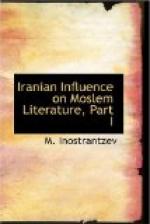place of their compositions. Here we may separate
a certain stratum of Persian element, and an analysis
of them may reveal partly contemporary knowledge and
partly elements of foreign religious ethics. The
third but not the last place in importance is occupied
by the Greek ethical tradition in which latterly are
discernible important Christian constituents.
Recent studies have yielded us as their result, this
structure of Musalman ethics. But it is to be
noted that the theoretical deductions at first sight
do not find confirmation in facts. For we do not
know which Greek books on ethics were translated in
the beginning of the period of the scientific development
of Islam, and for the support of our thesis we have
to point to the possibility of oral transmission of
Hellenic ethical tradition through Syriac scholars,
although this circumstance does not militate against
our hypothesis. Besides a small amount of translations
from Greek ethical works, especially the books of
Aristotle, there are observed among the works embodied
in this tradition a series of pseudographs which,
however, can have only an external relation with the
Greek sciences and which would rather lead to the
second group of the influences on Musalman ethical
monuments namely, the group of monuments of “Oriental
wisdom.” The most typical of the pseudographical
wisaya, or “Testaments” are ascribed
to Aristotle, Pythagoras, and others. To our
mind, they are derived from Persian tradition to the
same extent, if not in a larger extent than from the
Christian. Actual studies demonstrate that the
basal work for this epoch was the book above-mentioned
of Ibn Miskawaihi which as we saw above, issued from
Persian literary tradition. And the character
of that tradition can be explained from exterior circumstances
without an analysis of its contents. The fact
is that Ibn Miskawaihi worked upon that class of Persian
material, for instance the Pand Nameh or Andarz,
which had nothing to do with the province of the indefinite
gnomic literature but which had the character of a
catechism and therefore expresses a definite system
of religious morals, the morals of Parsism.[1] The
appreciation of the influence of Parsism on Islam has
only just commenced. But we are already in a position
to emphasise the great influence, which Parsi ethics
have exercised on Islam and this influence has been
attested by a number of Greek and Christian witnesses.
So far, for an acknowledgment of this influence serves
a purely external fact, namely, a glance at the bibliography
of the ancient ethico-didactic tracts in the Musalman
literature and an examination of the contents of the
book of Ibn Muskawaihi. A number of additional
facts confirm this hypothesis.
[Footnote 1: For a general review of the morals of Parsism see A.V.W. Jackson’s G. I. Ph. Vol. II, 678-683.]




